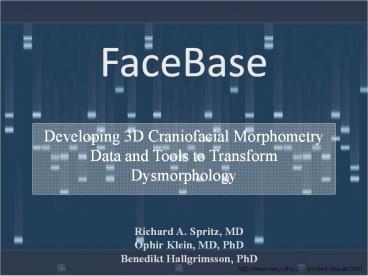FaceBase - PowerPoint PPT Presentation
Title:
FaceBase
Description:
FaceBase Developing 3D Craniofacial Morphometry Data and Tools to Transform Dysmorphology Richard A. Spritz, MD Ophir Klein, MD, PhD Benedikt Hallgrimsson, PhD – PowerPoint PPT presentation
Number of Views:53
Avg rating:3.0/5.0
Title: FaceBase
1
FaceBase
- Developing 3D Craniofacial Morphometry Data and
Tools to Transform Dysmorphology
Richard A. Spritz, MD Ophir Klein, MD,
PhD Benedikt Hallgrimsson, PhD
http//www.easy-dna.com/printed-dna-art.html
2
Overview
- What is FaceBase?
- Previous Work
- Purpose
- Our Goals
- How to Participate 3D Photos
- What will happen to the data we collect?
3
What is FaceBase?
- A group of research teams around the country
studying facial development and facial
characteristics. - www.facebase.org
4
Previous Work ? FaceBase1
- We studied genetic data and facial shape in
Tanzanian children
- We showed that 3D photos could distinguish
altered facial development from normal
5
Diagnostic Methods can be Improved
- Not sufficiently objective
- - Syndrome descriptions sometimes unclear
- Measurement Error
- - Manual measures are not very
- accurate or precise
- Limited Technology
- Some 2D and 3D photos
- Imprecise landmarking
6
Our Goals
- Library of 3D Facial Scans
- Diagnostic Aid for Physicians and Scientists
- Quantitative Science
7
How Does it Work?
- Dense Surface Modeling
- Geometric Morphometrics
- Automated facial landmarking
- Combine these analytical tools
- Apply to Clinical Practice!
Spritz et al
Storage, William. Augustus Once And For All
8
What will I need to do?
- Sign up for an appointment
- Sign consent forms
- - I will go over the consent form with you
- - HIPAA, Patient Bill of Rights
- Medical Information Form
- Includes consent for data-sharing
- De-identified photos and data to be deposited in
NIH FaceBase Hub database. May be shared to
qualified researchers approved by NIH Data
Access Committee.
9
3D Photos How to Participate
- 4 Face views will be collected
- Tie hair back
- Sit still just like for a normal picture
- About 10-20 minutes total
- Each participant will be given an anonymous study
number to preserve confidentiality
10
What will happen tomy Photo and Data?
- We will take your 3D photo
- 2. We will analyze the 3D image
- 3. We will place anatomic landmarks on the 3D
image - 4. We will analyze the 3D images of patients with
a specific known syndrome to define features
characteristic of each syndrome - 5. We will develop methods to distinguish among
different syndromes
11
Key Points
- FaseBase2 is a research study, and is part of a
larger international project - We aim to improve how we diagnose genetic
syndromes that include atypical facial
development - We need participants to take 3D Photos
- Let me know if you are interested and sign up for
an appointment!
12
Thank you!
- Are there any questions?
13
Study Contact Information
Name Phone Email/ Address
Richard A. Spritz, MD Anschutz Medical Campus University of Colorado, Denver TEL 303-724-3108 FAX 303-724-3100 richard.spritz_at_ucdenver.edu 12800 E. 19th Ave., Rm. 3100, MS8300 Aurora, CO 80045 USA
Ophir Klein, MD PhD School of Dentistry University of California, San Francisco TEL 415-476-4719 FAX 415-476-9513 ophir.klein_at_ucsf.edu 513 Parnassus Avenue Box 0442 San Francisco, CA 94143-0442
Benedikt Hallgrimsson, PhD Department of Cell Biology and Anatomy University of Calgary TEL 403-220-3060 FAX 403-283-5666 bhallgri_at_ucalgary.edu Rm G503, Health Sciences Centre, 3330 Hospital Drive, NW Calgary, AB T2N 4N1
Elizabeth Beals, BS Study Coordinator University of California, San Francisco TEL 415-476-2985 CEL 925-285-5722 elizabeth.beals_at_ucsf.edu































